could,should,would,can,shall,will的区别
- 格式:doc
- 大小:38.00 KB
- 文档页数:10
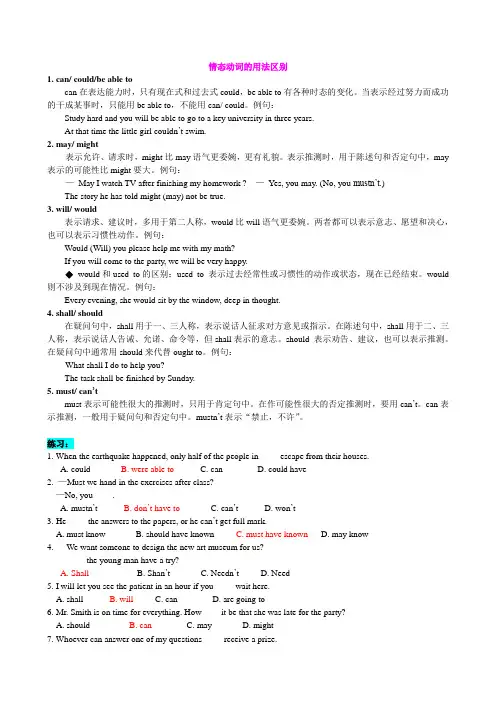
情态动词的用法区别1. can/ could/be able tocan在表达能力时,只有现在式和过去式could,be able to有各种时态的变化。
当表示经过努力而成功的干成某事时,只能用be able to,不能用can/ could。
例句:Study hard and you will be able to go to a key university in three years.At that time the little girl couldn’t swim.2. may/ might表示允许、请求时,might比may语气更委婉,更有礼貌。
表示推测时,用于陈述句和否定句中,may 表示的可能性比might要大。
例句:—May I watch TV after finishing my homework ? —Yes, you may. (No, you mustn’t.)The story he has told might (may) not be true.3. will/ would表示请求、建议时,多用于第二人称,would比will语气更委婉。
两者都可以表示意志、愿望和决心,也可以表示习惯性动作。
例句:Would (Will) you please help me with my math?If you will come to the party, we will be very happy.◆would和used to的区别:used to 表示过去经常性或习惯性的动作或状态,现在已经结束。
would 则不涉及到现在情况。
例句:Every evening, she would sit by the window, deep in thought.4. shall/ should在疑问句中,shall用于一、三人称,表示说话人征求对方意见或指示。
在陈述句中,shall用于二、三人称,表示说话人告诫、允诺、命令等,但shall表示的意志。
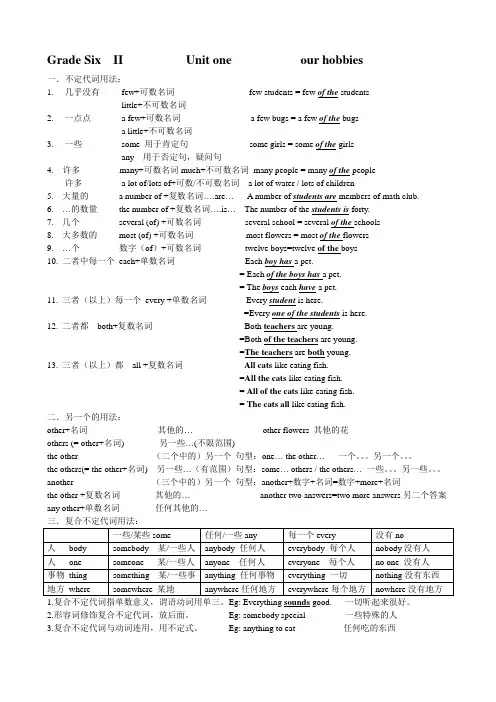
Grade Six II Unit one our hobbies一.不定代词用法:1.几乎没有few+可数名词few students = few of the studentslittle+不可数名词2.一点点 a few+可数名词 a few bugs = a few of the bugsa little+不可数名词3.一些some 用于肯定句some girls = some of the girlsany 用于否定句,疑问句4. 许多many+可数名词much+不可数名词many people = many of the people许多 a lot of/lots of+可数/不可数名词 a lot of water / lots of children5.大量的 a number of +复数名词….are… A number of students are members of math club.6.…的数量the number of +复数名词….is…The number of the students is forty.7.几个several (of) +可数名词several school = several of the schools8.大多数的most (of) +可数名词most flowers = most of the flowers9.…个数字(of)+可数名词twelve boys=twelve of the boys10.二者中每一个each+单数名词Each boy has a pet.= Each of the boys has a pet.= The boys each have a pet.11.三者(以上)每一个every +单数名词Every student is here.=Every one of the students is here.12.二者都both+复数名词Both teachers are young.=Both of the teachers are young.=The teachers are both young.13.三者(以上)都all +复数名词All cats like eating fish.=All the cats like eating fish.= All of the cats like eating fish.= The cats all like eating fish.二.另一个的用法:other+名词其他的…other flowers 其他的花others (= other+名词) 另一些…(不限范围)the other (二个中的)另一个句型:one… the other…一个。
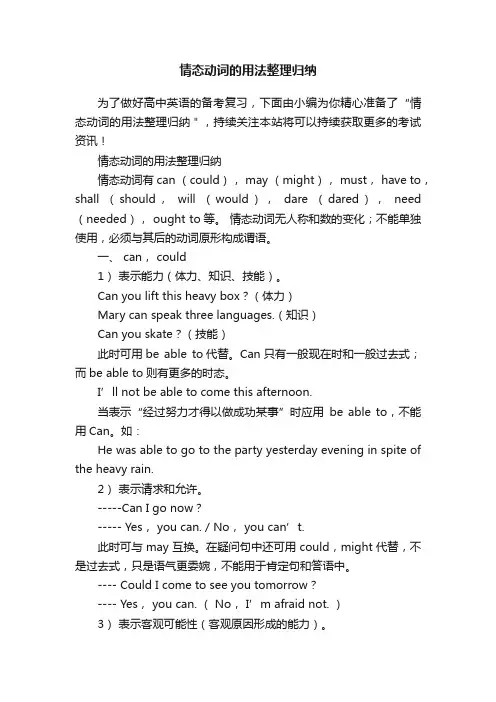
情态动词的用法整理归纳为了做好高中英语的备考复习,下面由小编为你精心准备了“情态动词的用法整理归纳",持续关注本站将可以持续获取更多的考试资讯!情态动词的用法整理归纳情态动词有can (could), may (might), must, have to,shall (should,will (would),dare (dared),need (needed), ought to等。
情态动词无人称和数的变化;不能单独使用,必须与其后的动词原形构成谓语。
一、 can, could1)表示能力(体力、知识、技能)。
Can you lift this heavy box?(体力)Mary can speak three languages.(知识)Can you skate?(技能)此时可用be able to代替。
Can只有一般现在时和一般过去式;而be able to则有更多的时态。
I’ll not be able to come this afternoon.当表示“经过努力才得以做成功某事”时应用be able to,不能用Can。
如:He was able to go to the party yesterday evening in spite of the heavy rain.2)表示请求和允许。
-----Can I go now?----- Yes, you can. / No,you can’t.此时可与may互换。
在疑问句中还可用could,might代替,不是过去式,只是语气更委婉,不能用于肯定句和答语中。
---- Could I come to see you tomorrow?---- Yes, you can. ( No,I’m afraid not. )3)表示客观可能性(客观原因形成的能力)。
They’ve changed the timetable,so we can go by bus instead.This hall can hold 500 people at least.4)表示推测(惊讶、怀疑、不相信的态度),用于疑问句、否定句和感叹句中。
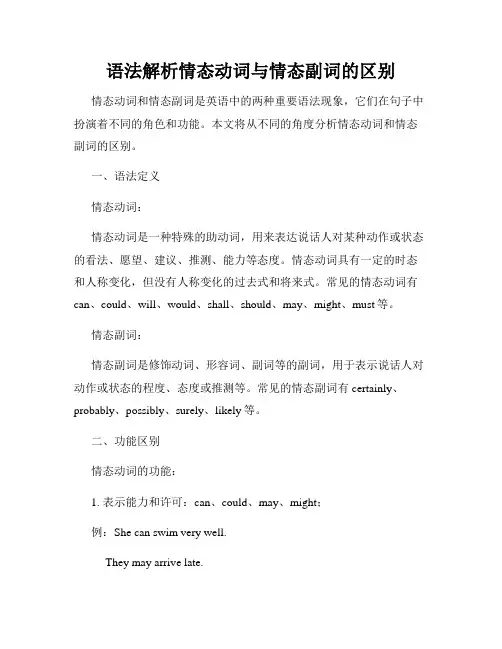
语法解析情态动词与情态副词的区别情态动词和情态副词是英语中的两种重要语法现象,它们在句子中扮演着不同的角色和功能。
本文将从不同的角度分析情态动词和情态副词的区别。
一、语法定义情态动词:情态动词是一种特殊的助动词,用来表达说话人对某种动作或状态的看法、愿望、建议、推测、能力等态度。
情态动词具有一定的时态和人称变化,但没有人称变化的过去式和将来式。
常见的情态动词有can、could、will、would、shall、should、may、might、must等。
情态副词:情态副词是修饰动词、形容词、副词等的副词,用于表示说话人对动作或状态的程度、态度或推测等。
常见的情态副词有certainly、probably、possibly、surely、likely等。
二、功能区别情态动词的功能:1. 表示能力和许可:can、could、may、might;例:She can swim very well.They may arrive late.2. 表示推测和猜测:must、should、ought to;例:He must be at home.They should know the answer.3. 表示愿望和建议:would、should;例:I would like to go skiing.You should exercise regularly.4. 表示必要和可能:must、will、would、shall、should、ought to;例:We must finish the project on time.I will help you with your homework.情态副词的功能:1. 表示肯定和确定:certainly、definitely、surely;例:She certainly knows the answer.He surely will come to the party.2. 表示可能性:likely、probably、possibly;例:He is likely to win the competition.It is probably going to rain tomorrow.3. 表示程度和加强语气:very、quite、really、extremely;例:It is very cold outside.She is quite intelligent.三、句子结构差异情态动词在句子中的结构:情态动词一般紧跟在主语之后,而后接动词原形,无需使用助动词do,也无需变化为进行时、完成时等其他时态形式。
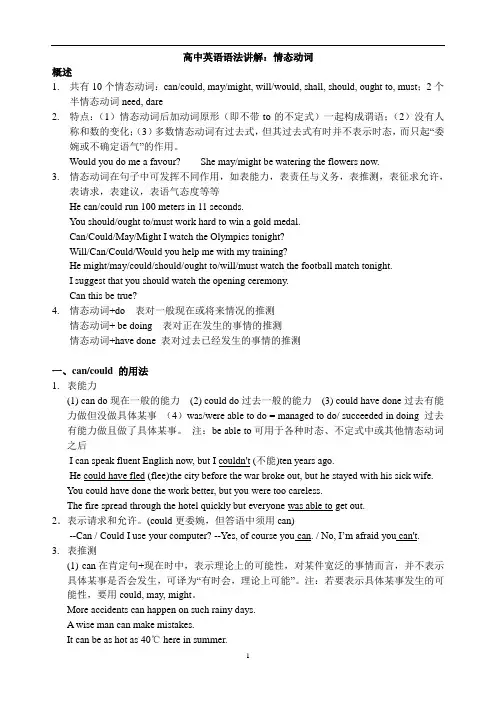
高中英语语法讲解:情态动词概述1.共有10个情态动词:can/could, may/might, will/would, shall, should, ought to, must;2个半情态动词need, dare2.特点:(1)情态动词后加动词原形(即不带to的不定式)一起构成谓语;(2)没有人称和数的变化;(3)多数情态动词有过去式,但其过去式有时并不表示时态,而只起“委婉或不确定语气”的作用。
Would you do me a favour? She may/might be watering the flowers now.3.情态动词在句子中可发挥不同作用,如表能力,表责任与义务,表推测,表征求允许,表请求,表建议,表语气态度等等He can/could run 100 meters in 11 seconds.You should/ought to/must work hard to win a gold medal.Can/Could/May/Might I watch the Olympics tonight?Will/Can/Could/Would you help me with my training?He might/may/could/should/ought to/will/must watch the football match tonight.I suggest that you should watch the opening ceremony.Can this be true?4.情态动词+do 表对一般现在或将来情况的推测情态动词+ be doing 表对正在发生的事情的推测情态动词+have done 表对过去已经发生的事情的推测一、can/could 的用法1.表能力(1) can do现在一般的能力(2) could do过去一般的能力(3) could have done过去有能力做但没做具体某事(4)was/were able to do = managed to do/ succeeded in doing 过去有能力做且做了具体某事。
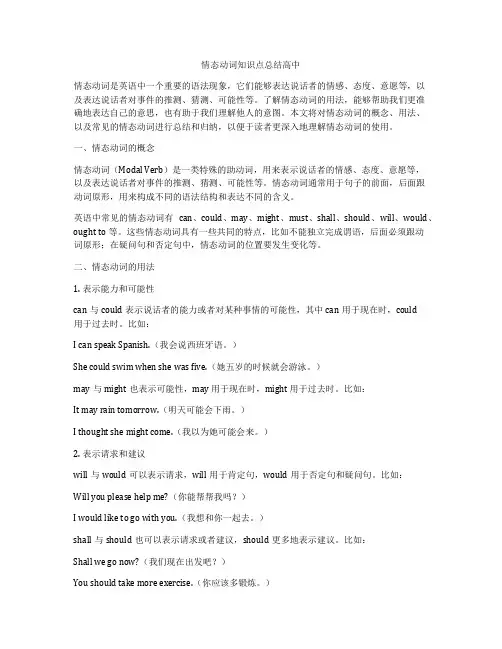
情态动词知识点总结高中情态动词是英语中一个重要的语法现象,它们能够表达说话者的情感、态度、意愿等,以及表达说话者对事件的推测、猜测、可能性等。
了解情态动词的用法,能够帮助我们更准确地表达自己的意思,也有助于我们理解他人的意图。
本文将对情态动词的概念、用法、以及常见的情态动词进行总结和归纳,以便于读者更深入地理解情态动词的使用。
一、情态动词的概念情态动词(Modal Verb)是一类特殊的助动词,用来表示说话者的情感、态度、意愿等,以及表达说话者对事件的推测、猜测、可能性等。
情态动词通常用于句子的前面,后面跟动词原形,用来构成不同的语法结构和表达不同的含义。
英语中常见的情态动词有can、could、may、might、must、shall、should、will、would、ought to等。
这些情态动词具有一些共同的特点,比如不能独立完成谓语,后面必须跟动词原形;在疑问句和否定句中,情态动词的位置要发生变化等。
二、情态动词的用法1. 表示能力和可能性can与could表示说话者的能力或者对某种事情的可能性,其中can用于现在时,could用于过去时。
比如:I can speak Spanish.(我会说西班牙语。
)She could swim when she was five.(她五岁的时候就会游泳。
)may与might也表示可能性,may 用于现在时,might 用于过去时。
比如:It may rain tomorrow.(明天可能会下雨。
)I thought she might come.(我以为她可能会来。
)2. 表示请求和建议will与would可以表示请求,will用于肯定句,would用于否定句和疑问句。
比如:Will you please help me?(你能帮帮我吗?)I would like to go with you.(我想和你一起去。
)shall与should也可以表示请求或者建议,should更多地表示建议。
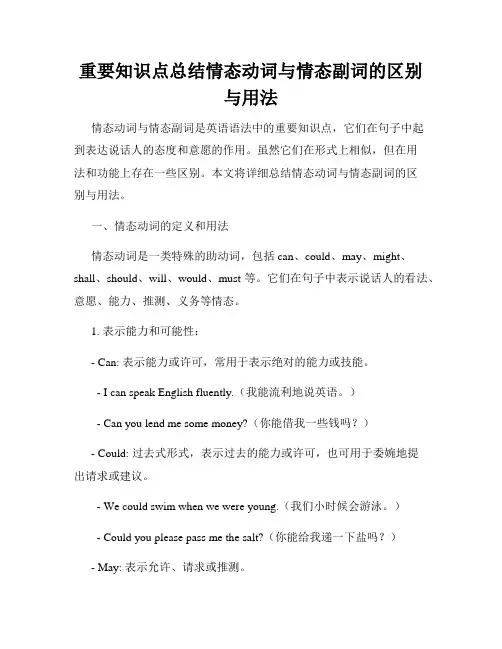
重要知识点总结情态动词与情态副词的区别与用法情态动词与情态副词是英语语法中的重要知识点,它们在句子中起到表达说话人的态度和意愿的作用。
虽然它们在形式上相似,但在用法和功能上存在一些区别。
本文将详细总结情态动词与情态副词的区别与用法。
一、情态动词的定义和用法情态动词是一类特殊的助动词,包括can、could、may、might、shall、should、will、would、must等。
它们在句子中表示说话人的看法、意愿、能力、推测、义务等情态。
1. 表示能力和可能性:- Can: 表示能力或许可,常用于表示绝对的能力或技能。
- I can speak English fluently.(我能流利地说英语。
)- Can you lend me some money?(你能借我一些钱吗?)- Could: 过去式形式,表示过去的能力或许可,也可用于委婉地提出请求或建议。
- We could swim when we were young.(我们小时候会游泳。
)- Could you please pass me the salt?(你能给我递一下盐吗?)- May: 表示允许、请求或推测。
- May I go to the restroom?(我可以去洗手间吗?)- It may rain tomorrow.(明天可能会下雨。
)- Might: 过去式形式,表示过去的允许、请求或推测。
与may的区别在于might的语气更委婉、推测性更强。
- She told me I might borrow her book.(她告诉我可以借她的书。
) - He said he might come to the party.(他说他可能会来参加派对。
)2. 表示意愿和建议:- Shall: 表示提议、请求或征求意见。
用于第一人称(I和we)中,常用于问句和疑问句。
- Shall we go for a walk?(我们出去走走吧?)- What shall I do next?(我接下来该做什么?)- Should: 表示应该、建议,常用于表达义务、推荐或提供建议。
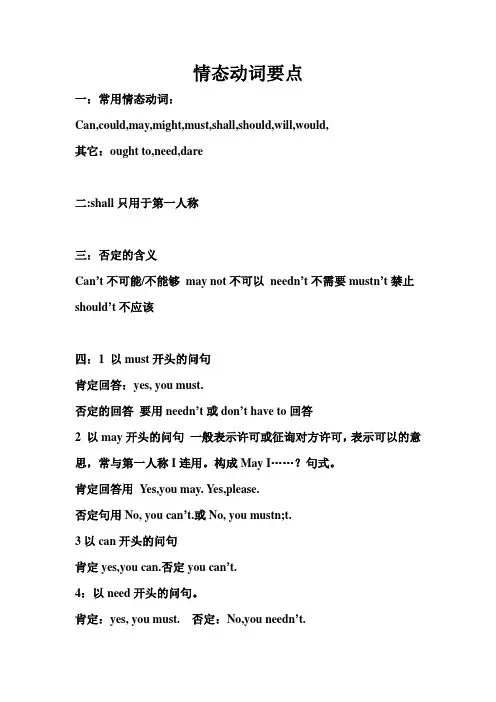
情态动词要点一:常用情态动词:Can,could,may,might,must,shall,should,will,would,其它:ought to,need,dare二:shall只用于第一人称三:否定的含义Can’t不可能/不能够may not不可以needn’t不需要mustn’t禁止should’t不应该四:1 以must开头的问句肯定回答:yes, you must.否定的回答要用needn’t或don’t have to回答2 以may开头的问句一般表示许可或征询对方许可,表示可以的意思,常与第一人称I连用。
构成May I……?句式。
肯定回答用Yes,you may. Yes,please.否定句用No, you can’t.或No, you mustn;t.3以can开头的问句肯定yes,you can.否定you can’t.4:以need开头的问句。
肯定:yes, you must. 否定:No,you needn’t.五:maybe和may be区别Maybe是副词,常做状语,意为也许可能,相当于perhaps位于句首。
May be是一个情态动词加动词原型的用法,是一个完整的谓语形式,意为可能是……也许是……例如:Maybe he is a teacher.=He may be a teacher.Maybe you are right=You may be right.六:must和have to区别Must是必须干什么,比较主观的要求命令Have to 是由于客观的原因不得不七:could只在问句中表示温婉礼貌请求,是一般现在时,回答要用can.八:need1:做实意动词是需要的意思,有人称和数的变化,通常在肯定句中2:做情态动词后接动词原型,通常在否定句和疑问句中。
反义疑问句要点一:定义:反义疑问句是由陈述句和附在后面的附加疑问句组成。
前否后肯,前肯后否。
二:附加疑问句的主语要用相应代词。
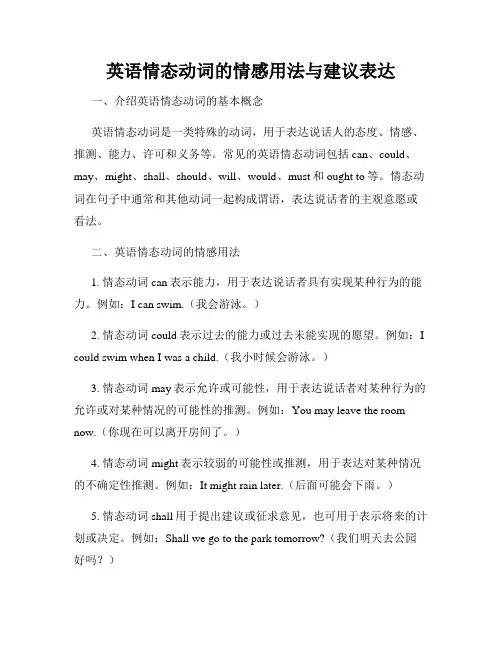
英语情态动词的情感用法与建议表达一、介绍英语情态动词的基本概念英语情态动词是一类特殊的动词,用于表达说话人的态度、情感、推测、能力、许可和义务等。
常见的英语情态动词包括can、could、may、might、shall、should、will、would、must和ought to等。
情态动词在句子中通常和其他动词一起构成谓语,表达说话者的主观意愿或看法。
二、英语情态动词的情感用法1. 情态动词can表示能力,用于表达说话者具有实现某种行为的能力。
例如:I can swim.(我会游泳。
)2. 情态动词could表示过去的能力或过去未能实现的愿望。
例如:I could swim when I was a child.(我小时候会游泳。
)3. 情态动词may表示允许或可能性,用于表达说话者对某种行为的允许或对某种情况的可能性的推测。
例如:You may leave the room now.(你现在可以离开房间了。
)4. 情态动词might表示较弱的可能性或推测,用于表达对某种情况的不确定性推测。
例如:It might rain later.(后面可能会下雨。
)5. 情态动词shall用于提出建议或征求意见,也可用于表示将来的计划或决定。
例如:Shall we go to the park tomorrow?(我们明天去公园好吗?)6. 情态动词should用于表达建议、批评、建议和义务等,表示某种行为符合某种标准或是值得推荐的。
例如:You should study harder.(你应该更加努力学习。
)7. 情态动词will通常用于表示将来的意愿、打算或预测。
例如:I will go shopping this afternoon.(我今天下午将去购物。
)8. 情态动词would表示过去的习惯或已经经过决定的未来计划。
例如:When I was young, I would visit my grandparents every summer.(我小的时候,每个夏天我都会去看望我的祖父母。
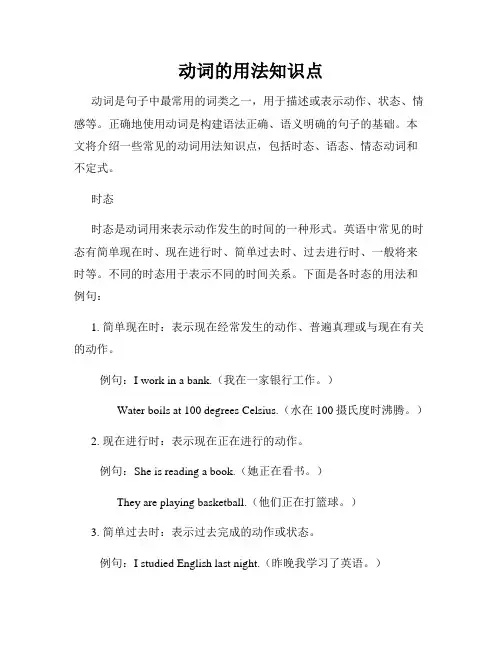
动词的用法知识点动词是句子中最常用的词类之一,用于描述或表示动作、状态、情感等。
正确地使用动词是构建语法正确、语义明确的句子的基础。
本文将介绍一些常见的动词用法知识点,包括时态、语态、情态动词和不定式。
时态时态是动词用来表示动作发生的时间的一种形式。
英语中常见的时态有简单现在时、现在进行时、简单过去时、过去进行时、一般将来时等。
不同的时态用于表示不同的时间关系。
下面是各时态的用法和例句:1. 简单现在时:表示现在经常发生的动作、普遍真理或与现在有关的动作。
例句:I work in a bank.(我在一家银行工作。
)Water boils at 100 degrees Celsius.(水在100摄氏度时沸腾。
)2. 现在进行时:表示现在正在进行的动作。
例句:She is reading a book.(她正在看书。
)They are playing basketball.(他们正在打篮球。
)3. 简单过去时:表示过去完成的动作或状态。
例句:I studied English last night.(昨晚我学习了英语。
)He lived in London for five years.(他在伦敦住了五年。
)4. 过去进行时:表示过去某一时间正在进行的动作。
例句:She was cooking dinner when I arrived.(我到达时她正在做晚饭。
)They were playing chess yesterday afternoon.(昨天下午他们在下棋。
)5. 一般将来时:表示将要发生的动作或存在的状态。
例句:We will go to the beach tomorrow.(我们明天去海滩。
) He is going to buy a new car next month.(他下个月打算买一辆新车。
)语态语态是动词表示主语在动作中所处的位置或动作的发出者。
英语中常见的语态有主动语态和被动语态。
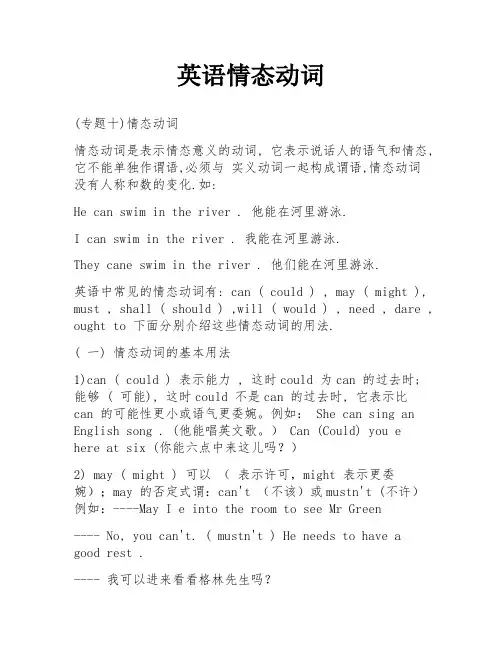
英语情态动词(专题十)情态动词情态动词是表示情态意义的动词, 它表示说话人的语气和情态,它不能单独作谓语,必须与实义动词一起构成谓语,情态动词没有人称和数的变化.如:He can swim in the river . 他能在河里游泳.I can swim in the river . 我能在河里游泳.They cane swim in the river . 他们能在河里游泳.英语中常见的情态动词有: can ( could ) , may ( might ), must , shall ( should ) ,will ( would ) , need , dare , ought to 下面分别介绍这些情态动词的用法.( 一) 情态动词的基本用法1)can ( could ) 表示能力 , 这时could 为can 的过去时; 能够 ( 可能), 这时could 不是can 的过去时, 它表示比can 的可能性更小或语气更委婉。
例如: She can sing an English song . (他能唱英文歌。
) Can (Could) you ehere at six (你能六点中来这儿吗?)2) may ( might ) 可以(表示许可,might 表示更委婉);may 的否定式谓:can't (不该)或mustn't (不许)例如:----May I e into the room to see Mr Green---- No, you can't. ( mustn't ) He needs to have a good rest .---- 我可以进来看看格林先生吗?----- 不,你不要进来。
它需要很好地休息。
3)must 必须 ;否定式 mustn't ,意思为:一定不要;回答must 提问时,否定用needn't , 如:----- Must I start at once 我必须立即开始吗?----- No , you needn't . 不,不必。
英语词汇难点解析will, shall的用法will, shall 的用法一、Shall 在现代应用中已多由will 代替。
目前常见的两种用法如下:1. 主语为第一人称时,可表示对自然事件的推测。
1)I shall/will be 20 years old next year.明年我就二十岁了。
2)When shall/will we know the results of the test?我们什么时候才能知道考试的结果。
2. 主词为第一人称时,可表示主语的意志。
3)I shall/will call you when I arrive.我一到就给你打电话。
4)We shall/will uphold the wishes of the people.我们一定要支持人民的意愿。
二、下列情形只能用shall而不能用will。
1. 用于建议或请求对方给予指导或意见时:A.一般用法:5)Shall I carry your bag? (Do you want me to …?) 要不要我替你提袋子?6)Shall we go out for lunch?我们要出去吃午饭吗?7) What shall we do?我们该怎么办?B 附加疑问句的用法:8) Let's go to the movie, shall we?我们去看电影,好不好?比较:9)Let me go, will you?让我走好不好?10) Let's not stay here, all right? / O.K?我们不要待在这儿好不好?下列三句用三个不同的助动词表达三个不同的意思。
11)Will you get me a newspaper when you're out? (不可用shall)出去的时候,给我带分报纸回来好吗?12) Shall I open the window for you? (不可用will )要不要我替你开窗?13)Where shall we be this time tomorrow? (可用shall/will )明天的这个时候,我们会在哪儿呢?2.用于第二、三人称时,shall 表示说话者强烈的情绪,如许诺、威胁、指令等。
情态动词有can (could), may (might), must, have to, shall (should, will (would), dare (dared), need (needed), ought to等。
情态动词无人称和数的变化;不能单独使用,必须与其后的动词原形构成谓语一、can, could1) 表示能力(体力、知识、技能)。
Can you lift this heavy box?(体力)Mary can speak three languages.(知识)Can you skate?(技能)此时可用be able to代替。
Can只有一般现在时和一般过去式;而be able to则有更多的时态。
I’ll not be able to come this afternoon.当表示“经过努力才得以做成功某事”时应用be able to,不能用Can。
如:He was able to go to the party yesterday evening in spite of the heavy rain.2) 表示请求和允许。
-----Can I go now?----- Yes, you can. / No, you can’t.此时可与may互换。
在疑问句中还可用could,might代替,不是过去式,只是语气更委婉,不能用于肯定句和答语中。
---- Could I come to see you tomorrow?---- Yes, you can. ( No, I’m afraid not. )3) 表示客观可能性(客观原因形成的能力)。
They’ve changed the timetable, so we can go by bus instead.This hall can hold 500 people at least.4) 表示推测(惊讶、怀疑、不相信的态度),用于疑问句、否定句和感叹句中。
情态动词语法讲解情态动词有:can( could),may(might),must( must), have to,shall( should),will( would),need( need), dare( dared),ought to.情态动词无人称和数的变化,不能独立使用.它与其后边的动词原形合成谓语.情态动词的具体用法如下:(一) can和 could的用法l.表示能力或客观可能性,还可以表示请求和允许.如:Can you finish this work tonight?Man cannot live without air.- Can I go now? - Yes,you can.注意:1). could也可表示请求,语气委婉,主要用于疑问句,不可用于肯定句,答语应用 can (即:could不能用于现在时态的简略答语中),例如:Could I come to see you tomorrow?Yes,you can (否定答语可用 No,I’m afraid not.)2).could可用于表示某事有可能发生或可能是事实。
Don ’t eat it. It could be poisonous. 不要吃, 它可能有毒。
The plane could be delayed by fog. 飞机可能会因为雾晚点。
3).can表示能力时,还可用 be able to代替.例如:I'll not be able to come this afternoon.但表示过去能成功做成某事, 要用was/were able to: The little bo y was able toescape from the big fire.4).can 可能,表示有时会… Jogging canbe harmful to the health.2.表示惊异、怀疑、不相信的态度。
(主要用在否定句、疑问句或感叹句中)Can this be true? How can yoube so careless!This cannot be done by him.3“ can( could)十 have十过去分词”的疑问或否定形式表示对过去发生的行为怀疑或不肯定.例如:He cannot have been to that town.Can he have got the book?4. could have +过去分词,表示过去本来可以做但却未做 What you said is right, but you could have done it better.5.一些常用句型:1).can not/never … too/enough…One can’t be too careful.I can’t thank you enoug h.2).can’t help doing… can’t help butdo…can’t but do…(二) may和 might的用法1.表示许可.表示请求、允许时, might比 may的语气更委婉一些,否定回答时要用mustn’t表示“不可以”、“禁止”、“阻止”之意.例如: You may drive the car.--Might/May I use your pen?-No,you mustn’t.用May I…征询对方许可在文体上比较正式,在口气上比较客气。
情态动词是一种本身有一定的词义,表示说话人的情绪,态度或语气的动词,但不能单独作谓语, 只能和其他动词原形构成谓语。
情态动词数量不多,但用途广泛,主要有下列:can (could), may (might), must, need, ought to, dare (dared), shall (should), will (would) .情态动词的位置:情态动词在句中放在谓语动词之前, 谓语动词前若有助动词,则在助动词之前,疑问句中, 情态动词则在主语之前。
情态动词的特点:情态动词无人称和数的变化, 情态动词后面跟的动词需用原形,否定式构成是在情态动词后面加"not"。
个别情态动词有现在式和过去式两种形式, 过去式用来表达更加客气, 委婉的语气, 时态性不强, 可用于过去,现在或将来。
情态动词的用法:can (could) 表示说话人能,可以,同意,准许,以及客观条件许可,could 为can 的过去式。
Must 必须,应该,一定,准是, 表示说话人认为有必要做某事, 命令, 要求别人做某事以及对事物的推测。
must 用来指一般现在时和一般将来时, 过去式可用have to 的过去式代替。
must + have + 过去分词,表示现在对过去事物的推测。
must 和have to 的区别: must 表示说话人的主观思想, have to 表示客观需要。
need 是一个情态动词, 他的用法完全和其他情态动词一样, 但need 还可当作实义动词使用, 这时need 就象其他动词一样,有第三人称,单复数, 后面加带to 的动词等特性。
needn't + have + 过去分词表示过去做了没必要做的事情。
dare 除用作情态动词外,更多的是当实义动词使用, 用法同实义动词一样,要考虑人称,单复数,时态等。
ought 应当,应该后面跟带有to 的动词不定式。
ought + to have done 句型。
情态动词的用法一、情态动词的基本用法情态动词本身虽有一定的意义,但它必须和动词一起构成谓语。
情态动词没有人称和数的变化(但have to除外),后接动词原形。
初中学过的情态动词有can, could, may, must,have to, will,shall, should, would, need等。
1. can / could表示“能力”或“客观可能性”,还可以表示“请求”和“允许”;用在否定句、疑问句或感叹句中,还可表示惊异、怀疑、不相信的态度;在一般疑问句第一人称中,表示“征询对方许可”(用could比用can语气更加委婉,但答语必须用can);在一般疑问句第二人称中,can和could往往用来表示说话人的请求或征询意见。
2. may表示“许可”,相当于“可以”;用于句型“May I ...?”时,表示征询对方许可。
3.must意为“必须、应当”,表示“义务、命令、必要”;在回答must引出的问句时,肯定回答用must,否定回答常用needn't或don'thave to,表示“没有必要”(若用mustn't,则表示“禁止”之意)。
4. need作情态动词时,多用于否定句或疑问句中,表示“需要”或“必要”。
5. shall表示说话人征求对方的意见或向对方提议;还可表示说话人给对方的命令、警告、允诺或威胁。
6. should 意为“应该”,表示义务、责任,可用于各种人称。
7.will用于疑问句中,表示说话人向对方提出请求或建议;还可用来表示做某事的意志、意愿、决心或打算。
8. would表示过去的习惯性动作,有“总是、常常”的意思;还可用于虚拟语气的主句中。
9. have to意为“不得不”,着重客观需要,可用于多种时态;它与must的区别为:must强调主观看法,没有时态变化。
二、情态动词must, may, might, can, could等表示“推测”以上情态动词除有各自自己的词义外,还可表示对事情的推测。
高考英语情态动词语法知识点与用法在英语学习中,情态动词经常出现,同时它也有很多讲究呢。
比如dare就很强硬,比较负面,而may就比较的和善,为了避免在谈话时把“讨论”变成“攻击”,我们一定要学会善用情态动词哦!小编整理了相关资料,希望能帮助到您。
高考英语情态动词语法知识点情态动词一、can和could1、can的用法(1)表示体力和脑力方面的能力。
(2)表示对现在的动作或状态进行主观的猜测,主要用在否定句和疑问句中。
(3)表示可能性,理论上的可能性,意为“有时候可能会”,可用于肯定句。
(4)表示允许,意思与may接近。
(5)表示说话人的推测、怀疑、惊异、猜测或不肯定等,主要用于否定句、疑问句或感叹句中。
(6)can的特殊句型cannot…too / enough表示“无论怎么。
也不过分”。
“越。
越好”。
cannot but+ do sth.表示“不得不,只好”。
2、could的用法(1)表示能力,指的是过去时间。
(2)表示允许,指的是过去时间。
(3)表示可能,可以指过去时间,也可以指现在时间,表示语气缓和。
(4)委婉客气地提出问题或陈述看法,指的是现在时间。
主要用于疑问句,回答时用can。
3、can与could的区别can表推测时只用于否定句和疑问句(could无此限制)。
couldn’t的可能性比can’t小。
4、can与be able to的区别(1)现在时:无区别,但后者不常用。
(2)完成时;can没有完成时,此时要用have(has,had)been able to。
(3)将来时:can没有将来时,要用will be able to。
(4)过去时:could表示一般能力,was/were able to 表示在具体场合通过努力成功做成某事的能力。
二、may 和might1、may的用法(1)表示询问或说明一件事可不可以做。
(2)表示一件事或许会发生或某种情况可能会存在,通常用在肯定句和否定句中。
could, should和would除了分别是can,shall和will 的过去式,还有其他的用法,有人学英语多年还容易将其搞混淆,因此使用时要特别注意:1.could的用法(1)表示惊异、怀疑、不相信等态度:How could John be so arrogant?约翰怎么这么傲慢?He couldn't be over forty. 他不可能有40多岁了。
Where could she be now?她现在能在哪儿呢?以上三个句子可以用can代替could,两者在时间上没有差别,只是用could时语气较缓和,用can时不相信程度更强一些。
(2)比较委婉客气地提出问题或陈述看法:Could(Can) you lend me your walkman?你能把随身听借给我用一下吗?Could I see your credentials?我可以看看你的证件吗?这时could和can没有时间上的差别。
(3)在虚拟条件句中作助动词,与谓语动词一起构成谓语:I could do it (if I would).(假如我愿意的话)我是能办到这一点的。
(指说话人不愿意)You could have done better if you had been more careful. 你要是再细心一点,是可以做得更好的。
2.should的用法(1)表示惊异、赞叹、不满等情绪:It is simply a miracle that rice should grow in such a place. 稻子竟能在这样的地方生长,这实在是个奇迹。
It's wonderful that you should get full marks. 你得了满分真了不起。
Why should you be so late today?你今天怎么来得这么晚?(2)表示委婉地陈述自己的意见:I should think you are right. 我想你是对的。
(3)(表示语气较强的假设)万一,竟然:If he should fail to come, ask Tom to work in his place. 万一他不来,就叫汤姆代替他工作。
(4)(表示可能性、推测)可能,该:My sister should be home by now. 我妹妹现在应该到家了。
(5)(表示建议、命令、愿意等)应该:I move that he should come with us. 我坚持他应和我们一起去。
3.would的用法(1)用在虚拟语气的主句中:If you went to see him, he would be delighted. 如果你去看他,他一定非常高兴。
She would have come if she hadn't been so busy. 要不是忙她就来了。
(2)委婉地提出请求、建议或看法:Would you take a seat?请坐!(3)表示意愿,在陈述语气和虚拟语气都可用:He would not leave before he finished his work. 他在完成工作以前不愿离开。
(4)表示过去反复发生的动作:Now and then a blackbird would call. 不时会有山鸟叫。
(5)表示过去的一种倾向:The wound would not heal. 伤口老不愈合。
(6)表示推测:That would be in spring 1989. 那大概是在1989年春天。
================================= =======should和would都是情态动词,也是助动词,你应该知道,它们两个有时也可以不译。
首先should,在汉语中,我们常译为:应该。
而would 常译为:可以或者是将要。
给个例子you should clean the classroom。
你应该打扫教室。
It would be rain soon 。
不久将会下雨。
而仅仅将这两个词做比较,显然should 比would语气更强烈我今年刚高考完。
还有几个需要提醒你,1个用法sb shuold have done sth 某人应该做什么事(注意是应该,而实际上没做)。
*********************************************should和would的区别和用法1)should无词义,只是shall的过去形式,与动词原形构成过去将来时,只用于第一人称。
例如:I telephoned him yesterday to ask what I should do next week. 我昨天给他打电话,问他我下周干什么。
比较:"What shall I do next week?" I asked. "我下周干什么?"我问道。
(可以说,shall变成间接引语时,变成了should。
)2)would 也无词义,是will的过去形式,与动词原形构成过去将来时,用于第二、第三人称。
例如:He said he would come. 他说他要来。
比较:"I will go," he said. 他说:"我要去那儿。
" 变成间接引语,就成了:He said he would come. 原来的will变成would,go变成了come.。
should 本应该做某事却没有做,表示责备和遗憾.如; You should ahve told me the news eariler.would 表示与事实相反。
1。
If I were a bird, I would be happy.(与现在事实相反)2. If I had told him the news, he would have cried..(与过去事实相反)3. If I were to go tomorrow, I would take a plane..(与将来事实相反)should have done 是翻译为本该做某事而没做would have filled 没有这个意思1 Like the rules governing the use of shall and will on which they are based, the traditional rules governing the use of should and would are largely ignored in modern American practice. Either shouldor would can now be used in the first person to express conditional futurity:就象作为shall 和will 词的基础的限用的用法规则一样,适用于should 和would 这个词的传统使用规则在现代美国英语中也已被忽略了。
现在should 或would 这两个词中的任何一个都可以用于第一人称,表示条件式中的将来:If I had known that, I would (or somewhat more formally, should ) have answered differently.如果已经知道了这个情况的话,我就(或正规一点用should )不会那么回答了,2 But in the second and third persons only would is used:但在第二人称或第三人称中只用would :If he had known that, he would (not should ) have answered differently.如果他知道那个情况的话,就(不能用should )不会那么回答了。
3 Wouldcannot always be substituted for should, however. Should is used in all three persons in a conditional clause:但是Would并不是总是能由should 代替。
Should 在三种人称的条件从句中都可以用:if I (or you or he ) should decide to go.如果我(或你或他)决定要去。
4 Should is also used in all three persons to express duty or obligation (the equivalent of ought to ):Should用于这三种人称的表示职责和义务的句子中(相当于ought to ):I (or you or he ) should go.我(或者你或者他)应该去。
5 On the other hand, would is used to express volition or promise:另一方面,would 用来表达决心或保证:I agreed that I would do it.我一定会做的。
6 Either would or should is possible as an auxiliary with like, be inclined, be glad, prefer, and related verbs:而would 或should 都可以作助词和like,be inclined,be glad,prefer 及其相关词语一起使用:I would (or should ) like to call your attention to an oversight.我想(或should )请你注意一下一个疏漏之处。
7 Here would was acceptable on all levels to a large majority of the Usage Panel in an earlier survey and is more common in American usage than should. ·Should have is sometimes incorrectly written should of by writers who have mistaken the source of the spoken contraction should've. See Usage Note at if, rather, shall在此处,在一次早期的调查中对大多数各阶层的使用者来说,would 是可以接受的,且在美国用法中比should 更为常见。